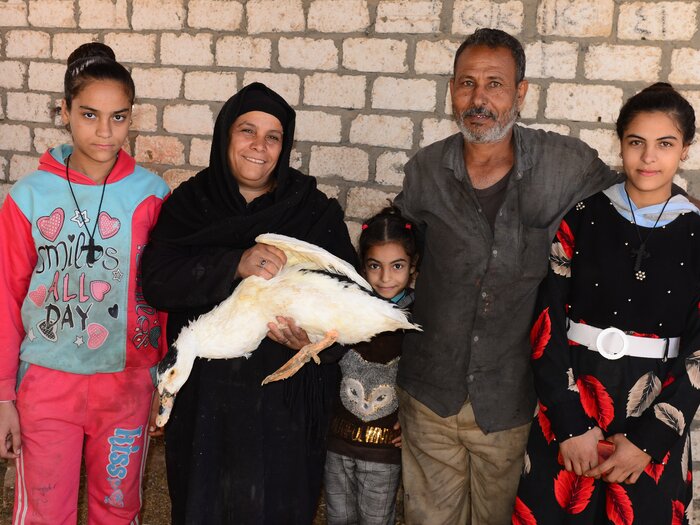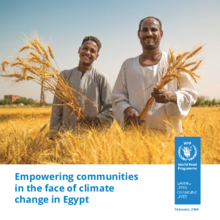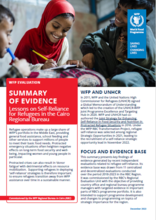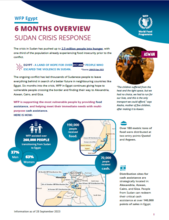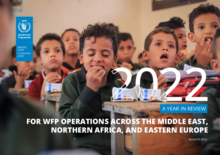Egypt
- 29.7%
- live beneath the income poverty line
- 14.4%
- of the population are food insecure
- 105.9 million
- population
With a growing population of almost 106 million, Egypt is the most populous country in North Africa and the Arab world, and an influential geopolitical actor in the region.
In line with Egypt’s Sustainability Development Strategy: Vision 2030, the country transformed the scope of its national social protection programmes and the National School Feeding Programme to better support vulnerable groups.
While maintaining positive economic growth, Egypt faces long-standing development challenges. Crises including the COVID-19 pandemic have deepened development challenges, causing economic instability, and heightening issues like food insecurity and malnutrition for local communities and refugees.
According to the 2023 Global Hunger Index, Egypt sustains a moderate level of hunger, ranking 57 out of 121 countries. Food affordability, quality and safety remain challenges as Egypt continues to rely on global markets for more than half of its staples.
Malnutrition is another public health concern, with a 13 percent stunting rate, and 4 percent of children aged under 5 years underweight.
WFP’s programme for 2023-2028 complements government efforts to assist vulnerable groups by securing basic food and nutritional needs, building resilience and recovery, improving employment prospects and strengthening national institutional capacities.
What the World Food Programme is doing in Egypt
-
Support to refugees and migrants
-
WFP is providing support to crises affected populations, including refugees, to ensure they are able to secure the basic needs of their families. WFP is providing more than just food assistance, WFP offers a lifeline – nourishing bodies, boosting nutrition, and building the path towards self-reliance. While addressing the urgent needs of crisis affected populations through cash and nutrition assistance, WFP also addresses crisis affected population’s long term needs by providing vocational trainings that boost employability.
-
Youth and women empowerment
-
Together with partners WFP is nurturing the potential of young women and men, including those with disabilities, aged 18-35 years. WFP progammes offer on-the-job learning opportunities and provide career guidance and coaching led by private sector partners. Additionally, WFP works for the economic inclusion of all, particularly women in rural areas. After mastering business skills and completing vocational trainings, women are provided with micro-loans to launch their income-generating projects, helping boost their income and food security.
-
Resilience building
-
From small seeds to big changes, WFP supports the backbone of Egypt's agriculture – smallholder farmers. In partnership with the Government, WFP works to strengthen smallholder farmers’ and Bedouin communities’ capacity to adapt to the effects of climate change and improve agricultural productivity. This is done through improved agricultural and irrigation practices, developing connections to markets, financial literacy and inclusion, and cash-based transfers.
-
School feeding
-
WFP supports the National School Feeding Programme, extending its reach to the most rural areas in Egypt. Through innovative, sustainable school-based initiatives, WFP is not only feeding minds but also nourishing bodies. WFP provides nutritious, daily in-school snacks (fortified date bars) to community school children, securing 25% of a child’s daily nutritional needs. To further incentivize retention in schools and combat child labour and early marriage, WFP provides cash assistance to families of community schoolchildren linked to their child’s regular attendance of school. Together with partner Ministries, WFP also supports the advancement of 21st century education, through the use of digital tools and teacher trainings.
-
Nutrition
-
WFP believes in healthy beginnings for all. WFP complements Egypt's nutrition-sensitive social protection system, giving extra care to pregnant and nursing women and children under 2. Under the ”First 1,000 Days" nutrition programme, WFP and the Government provide cash top-ups to pregnant and nursing women, to help secure their essential nutrition. WFP also provides technical support to national nutrition activities and awareness-raising campaigns.
-
Country capacity strengthening
-
By building bridges of knowledge, fostering cooperation between nations, and sharing solutions, WFP seeks to galvanize sustainable development. WFP provides technical and capacity-strengthening support to national institutions and governmental bodies, improving national capacities to adopt technological solutions for the collection, management and analysis of information; strengthening supply chains; and improving regional and global knowledge-sharing for development.
Egypt news releases
Go to pagePartners and donors
View allFind out more about the state of food security in Egypt
Visit the food security analysis pageOperations in Egypt
Contacts
Office
49 Street 105, Hadaek El Maadi,
Egypt

